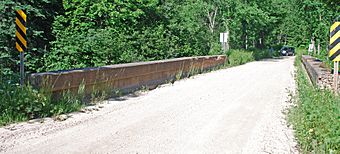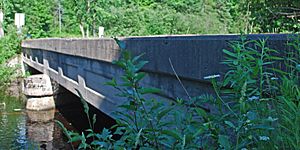King Road–Whitefish River Bridge facts for kids
Quick facts for kids |
|
|
King Road–Whitefish River Bridge
|
|

Bridge deck
|
|
| Location | King Road over Whitefish River, Limestone Township, Michigan |
|---|---|
| Area | less than one acre |
| Built | 1919 |
| Built by | Samuel Mills |
| Architect | Michigan State Highway Department |
| Architectural style | concrete through girder |
| MPS | Highway Bridges of Michigan MPS |
| NRHP reference No. | 99001463 |
| Added to NRHP | November 30, 1999 |
The King Road–Whitefish River Bridge is a historic bridge in Limestone Township, Michigan. It crosses the Whitefish River and was added to the National Register of Historic Places in 1999. This bridge is a cool example of early 20th-century engineering!
History of the King Road–Whitefish River Bridge
Back in the 1910s, a network of important roads was being built in Alger County. One of these roads connected the towns of Trenary and Skandia. By 1919, this road was almost finished. The only missing piece was a bridge over the Whitefish River.
In 1919, engineers from the Michigan State Highway Department designed the bridge. They called it Trunk Line Bridge Number 264. Its design was based on standard plans the department had created a few years earlier.
The job to build the bridge went to Samuel Mills from Escanaba. He built the bridge in 1919 for $1,688.25. That's about $30,000 in today's money! The road, including this bridge, later became part of US Highway 41.
Later, US 41 was moved to a new path. A new bridge was built about half a mile south of this one. The old section of road, including the historic bridge, was renamed King Road. It still carries local traffic today.
What the King Road–Whitefish River Bridge Looks Like
The King Road–Whitefish River Bridge is a type of bridge called a "girder bridge." It has two strong concrete beams, called girders, that are 35 feet (about 10.7 meters) long. These girders support the bridge deck. The bridge rests on concrete supports at each end and a concrete pier in the middle.
The top of the bridge is a flat concrete slab. The tall girders rise up on each side, acting as the guardrails. You can find a special bronze plate on the inside of the girders. It says "Trunk Line Bridge," showing its original purpose.
Even though the bridge is very old, its main structure hasn't changed much. However, some of the concrete has chipped or flaked off over time.
This bridge is important because it was built quite early for a girder-style bridge. It's also special because it has two spans, meaning it crosses the river in two sections.




